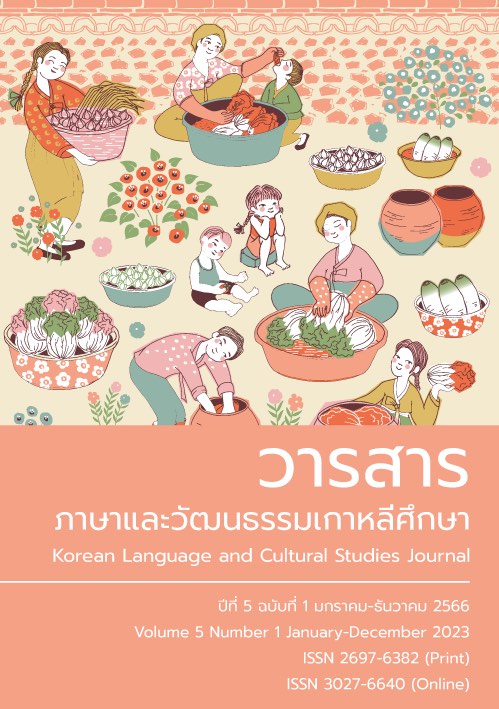Study of Nationalism and Korean Democratization: 1987-1993
Main Article Content
Abstract
This study aimed to examine the factors that contributed to the consolidation of democracy in Republic of Korea (South Korea) during 1987-1993. The research employed the threshold definition of the consolidation of democracy as avoiding a democratic breakdown and focused on an expression of South Korean nationalism during this period that influenced the civil movement within and outside the National Assembly. It also minimized the risk of democratic collapse and stabilized the democratic government. According to the findings, the South Korean people diverted their focus to the new expression of nationalism. When the country was falling into authoritarianism and coup d’états, the growing unease of the civilians led to dissatisfaction with the U.S. government that had worked with the South Korean government. As a consequence, the people focused on anti-Americanism. After the transition to democracy in 1987, negative sentiment toward foreign countries declined, while the pride of the nation was on the increase due to the Seoul Olympic Games in 1988, Nordpolitik, economic success, and democratization during the end of the Cold War. These aspects evaluated South Korea’s status in the national arena and made it become one of the world's leaders. Furthermore, South Korean success was an undercurrent that favored Roh Tae-woo’s administration and allowed Roh Tae-Woo to finish his term without any intervention by an external power and in a peaceful transition to the new government. This was a success in avoiding the democratic breakdown in the Roh Tae-Woo era.
Article Details
References
Aleman, J. (2005). Protest and Democratic Consolidation: A Korean Perspective. International Journal of Korean Studies, 9, 71-91.
Ceuster, K. d. (2005). Pride and Prejudice in South Korea's Foreign Policy. The Copenhagen Journal of Asian Studies, 21, 64-90.
Cho, Ji Hyun (2009). The Seoul Olympic Games and Korean society: causes, context and consequences. Doctoral Thesis, Exercise and Health Sciences, Loughborough University, London.
C-SPAN. (1989). ROH TAE WOO, President of the Republic of Korea, addressed the Joint Meeting of Congress. Retrieved June 16, 2023. Retrieved June 29, 2023, from https://www.cspan.org/video/?95 86-1/south-korean-president-address
Dornbusch, R., Park, Y. C., Collins, S. M., & Corbo, V. (1987). Korean Growth Policy. Brookings Papers on Economic Activity, 1987(2), 389-454.
Heo, U. J., Houngcheul; Kim, Hayam; and Kim, Okjin. (2008). he Political Economy of South Korea: Economic Growth, Democratization, and Financial Crisis. Maryland Series in Contemporary Asian Studies,
(2), 1-24.
Heo, U., & Hahm, S. D. (2014). Political Culture and Democratic Consolidation in South Korea. Asian Survey, 54(5), 918–940.
HN. (1989, April 5). Roh Tae Woo's Difficult Passage. The Christian Science Monitor. Retrieved June 16, 2023, from https://www.csmonitor.com/ 1989/0405/ekor-f.html
Huntington S. P. (1991). The third wave: democratization in the late twentieth century. University of Oklahoma Press.
Im Hyung Baeg. (2000). South Korea Democratic Consolidation in Comparative Perspective. In Diamond, L. & Kim, B. (Eds.), Consolidating Democracy in South Korea. Boulder (pp. 21-47). USA: Lynne Rienner Publishers.
Jonsson, G. (2014). Consolidation of democracy in South Korea. Stockholm University.
Kim, J. W. (2015). The Factors That Influenced South Korean Perceptions of the United States in the Early 1990s. The Society of History Education, 55, 275-305.
Kim, Sunhyuk. (1997). State and Civil Society in South Korea’s Democratic Consolidation: Is the Battle Really Over?. Asian Survey, 37(12), 1135- 1144.
Kohn, H. (2023). Nationalism. Encyclopedia Britannica. Retrieved October 12, 2023, from https://www.britannica.com/topic/nationalism
Korea Social Science Data Archive. (2009). The Democratic Politics Desired by Korean Citizens CODE BOOK.
Korea Social Science Data Archive. (2012a). Survey on Tasks and Prospects of Korean Society after the Seoul Olympics CODE BOOK.
Korea Social Science Data Archive. (2012b). Survey on Values and Attitudes in Transitional Korea 5, 1989 CODE BOOK.
Lie, J. (1998). Han Unbound: The Political Economy of South Korea. Stanford University Press.
Maass, P. (1990). ROH FIRES 2 OFFICIALS IN S. KOREA. The Washington Post. Retrieved October 9, 2023, from https://www.washing tonpost.com/archive/politics/1990/10/09/roh-fires-2-officials-in-s-korea/25581c2e-092e-408b-8009-811b1cca7ff8/
Mylonas, H., & Tudor, M. J. (2021). Nationalism: What We Know and What We Still Need to Know. Annual Review of Political Science, 24, 109-132.
Pack, Howard; Page, John; Sabor, Richard; Stiglitz, Joseph E. (1993). The East Asian Miracle Economic Growth and Public Policy. Oxford University Press.
Shin, G.-W., Chang, P. Y., Lee, J.-E., & Kim, S.-K. (2007). South Korea's democracy movement (1970-1993) Stanford Korea democracy project report.
Song, H. (1999). Labour Unions in the Republic of Korea: Challenge and Choice. Seoul: Seoul National University.
Strnad, G. (2010). The Sixth Republic under Roh Tae Woo: The Genesis of South Korean Democracy. Police Political Science, 39, 204-225.
Times, T. N. Y. (1988, November 29). Korea's Careful Path to Democracy. Retrieved June 16, 2023, from https://www.nytimes.com/1988/11/29/ opinion/korea-s-careful-path-to-democracy.html
Woo, H. Y. (2010). A Review of Korean History Vol. 3 Modern/Contemporary Era. Gyeonggi-do: Kyongsaewon.
Yoon, S. (1999). Interest groups and foreign policy in South Korea: a case study. Journal of International and Area Studies, 6(1), 51-63.


